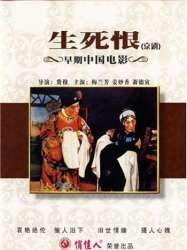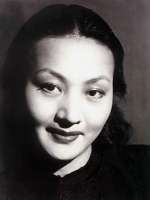Mei Lanfang est un Acteur et Scénariste Chinois né le 22 octobre 1894

Mei Lanfang (simplified Chinese: 梅兰芳; traditional Chinese: 梅蘭芳; pinyin: Méi Lánfāng; October 22, 1894 – August 8, 1961) was one of the most famous Peking opera artists in modern history, exclusively known for his qingyi roles, a type of dan role. Mei Lanfang is his stage name, and in Chinese it is generally considered a feminine name. His real name was Méi Lán (Chinese: 梅兰). Mei, Shang Xiaoyun, Cheng Yanqiu and Xun Huisheng were known as Four Great Dan in the golden era of Peking Opera.
Mei was the first artist to spread Beijing Opera to foreign countries, participating in cultural exchanges with Japan, the United States, and other regions. He toured the world, forming friendships with the western contemporaries of his day, including Charlie Chaplin. In 1930 he toured North America, visiting Hollywood, where he welcomed by Douglas Fairbanks and Mary Pickford. In 1935, Mei toured Europe, playing to appreciative audiences in Berlin and Moscow. Seeing Mei perform especially impressed the German playwright Bertold Brecht and influenced his concept of the alienation effect.
In July 1937, the Marco Polo Bridge Incident occurred, and the Imperial Japanese Army soon occupied Beijing. The commander of the Japanese Army ordered Mei to perform for them and appointed Mei to a high rank official position. But Mei refused to sing throughout the duration of the war and endured an impoverished lifestyle until the war ended in 1945.
After 1949 he served as director of China Beijing Opera Theater, director of the Chinese Opera Research Institute, and vice-chairman of China Federation of Literary and Art Circles. Besides his autobiography, Forty Years of Life on the Stage, several of his articles and essays have been published in The Collected Works of Mei Lanfang. Recordings of his best-known performances have been published in A Selection of Beijing Operas Performed by Mei Lanfang. In 2000, the story of his life was filmed in a documentary entitled The Worlds of Mei Lanfang. Acclaimed director Chen Kaige directed Forever Enthralled, a film biography of Mei's life, released in December 2008.
Source : Wikidata
Mei Lanfang

Biographie
Mei was born in Beijing in 1894 into a family of Peking opera and Kunqu performers of Taizhou, Jiangsu ancestry. He made his stage debut at the Guanghe Theatre in 1904 when he was 10 years old. In his 50-year stage career, he maintained strong continuity while always working on new techniques. His most famous roles were those of female characters; skillful portrayal of women won him international acclaim, and his smooth, perfectly timed, poised style has come to be known in opera circles as the "Mei School." He also played an important part in continuing the performance tradition of Kunqu, noted particularly for his interpretations of Du Liniang (杜丽娘; in The Peony Pavilion) and Bái Sùzhēn (白素贞; in Leifeng Pagoda) and Beauty Yu (in Farewell My Concubine). Mei's famous portrayal of Beauty Yu was so historically moving that Wenting Song say he is one of the greatest vocal artists in modern China.Mei was the first artist to spread Beijing Opera to foreign countries, participating in cultural exchanges with Japan, the United States, and other regions. He toured the world, forming friendships with the western contemporaries of his day, including Charlie Chaplin. In 1930 he toured North America, visiting Hollywood, where he welcomed by Douglas Fairbanks and Mary Pickford. In 1935, Mei toured Europe, playing to appreciative audiences in Berlin and Moscow. Seeing Mei perform especially impressed the German playwright Bertold Brecht and influenced his concept of the alienation effect.
In July 1937, the Marco Polo Bridge Incident occurred, and the Imperial Japanese Army soon occupied Beijing. The commander of the Japanese Army ordered Mei to perform for them and appointed Mei to a high rank official position. But Mei refused to sing throughout the duration of the war and endured an impoverished lifestyle until the war ended in 1945.
After 1949 he served as director of China Beijing Opera Theater, director of the Chinese Opera Research Institute, and vice-chairman of China Federation of Literary and Art Circles. Besides his autobiography, Forty Years of Life on the Stage, several of his articles and essays have been published in The Collected Works of Mei Lanfang. Recordings of his best-known performances have been published in A Selection of Beijing Operas Performed by Mei Lanfang. In 2000, the story of his life was filmed in a documentary entitled The Worlds of Mei Lanfang. Acclaimed director Chen Kaige directed Forever Enthralled, a film biography of Mei's life, released in December 2008.
Le plus souvent avec
Filmographie de Mei Lanfang (2 films)
Acteur

Remorse at Death (1948)
Réalisé par Fei Mu
Genres Drame
Thèmes La musique, Musique
Acteurs Mei Lanfang
Rôle Han Yuniang
Note60%






Yi jian mei (1931)
, 1h40Réalisé par Bu Wancang
Genres Romance
Thèmes Adaptation d'une pièce de théâtre, Adaptation d'une pièce de théâtre de William Shakespeare
Acteurs Ruan Lingyu, Jin Yan, Li Lili, Mei Lanfang
Note59%





The film tells the story of Bai Lede (Wang Chilong) and Hu Luting (Jin Yan), two military cadets who have been friends since they were children. After graduating, Hu, a playboy uninterested in love, is appointed as a captain in Guangdong and leaves his home town in Shanghai. Bai however, deeply in love with Hu's sister, Hu Zhuli (Ruan Lingyu) stays behind. At Guangdong, Hu falls in love with the local general's daughter, Shi Luohua (Lin Chuchu), although the general, Shi (Wang Guilin), is unaware of the relationship, and instead wants his daughter to marry the foolish Liao Di'ao (Gao Zhanfei). Meanwhile, Bai's father uses his influence to get Bai posted to Guangdong, and after a sorrowful farewell between himself and Zhuli, he arrives at his new post and instantly falls in love with Luohua. In an effort to have her for himself, Bai betrays his friend, by informing General Shi of his daughter's plans to elope with Hu, leading to Shi dishonourably discharging Hu. Bai tries to win Luohua over, but she is uninterested, only concerned with lamenting the loss of Hu. In the meantime, Hu encounters a group of bandits who ask him to be their leader, to which he agrees, planning on returning for Luohua at some point in the future. Some time passes, and one day, as Luohua, Bai and Liao are passing through the forest, they are attacked. Luohua manages to flee, and Bai pursues her into the forest. They engage in an argument, but just as Bai seems about to lose his temper, Hu intervenes, and he and Luohua are reunited. General Shi arrives in time to see Liao flee the scene, and he now realises that he was wrong to get in the way of the relationship between Hu and his daughter. Hu then forgives Bai his betrayal, and Bai reveals that he has discovered that his only true love is in fact Zhuli back in Shanghai.
Scénariste

Remorse at Death (1948)
Réalisé par Fei Mu
Genres Drame
Thèmes La musique, Musique
Acteurs Mei Lanfang
Note60%





 Connexion
Connexion




